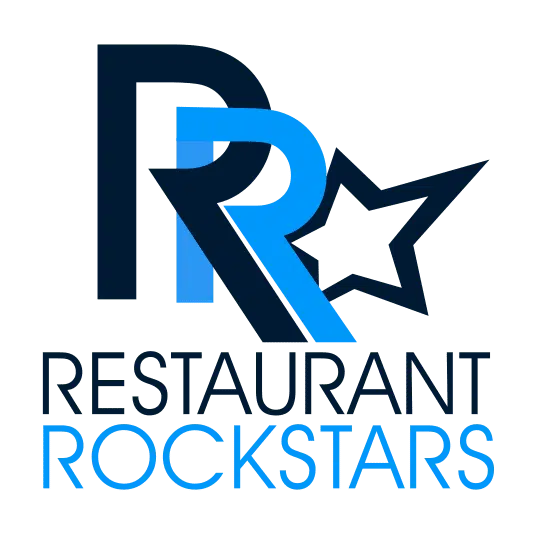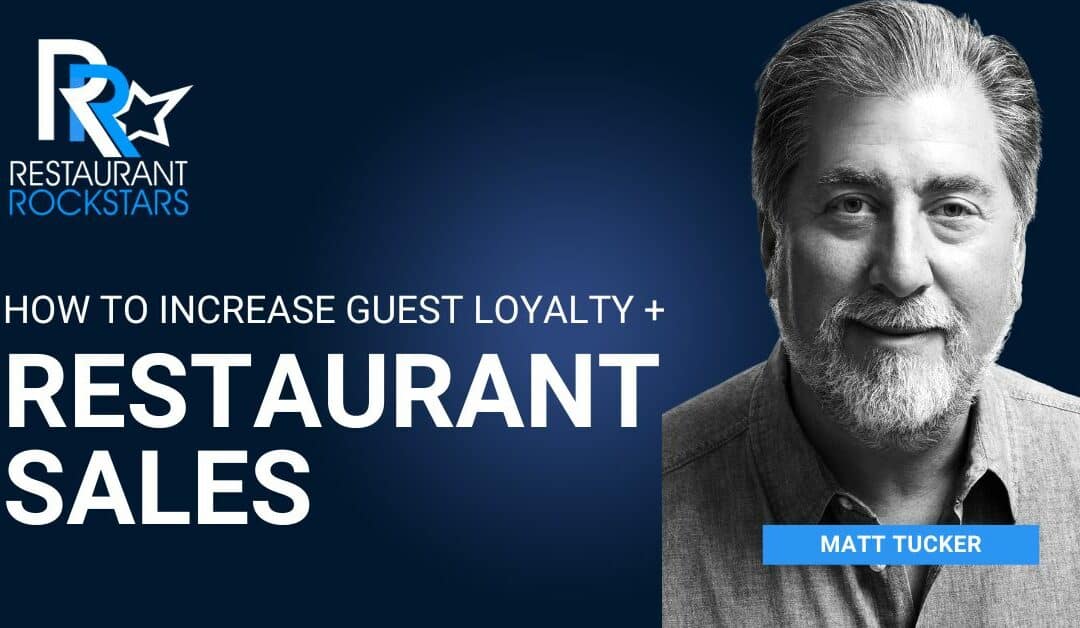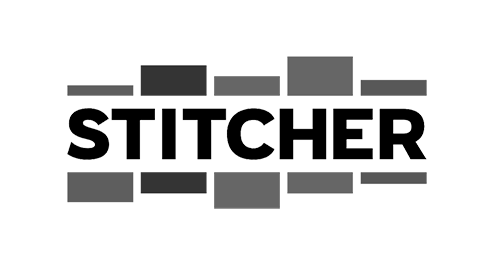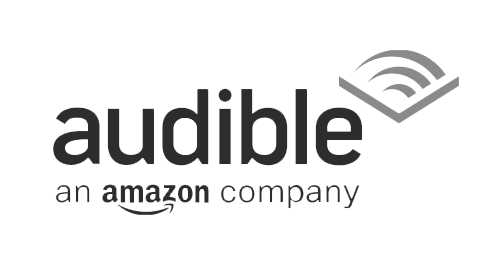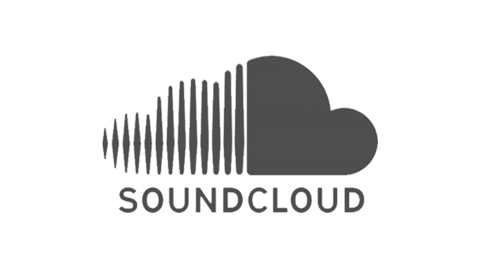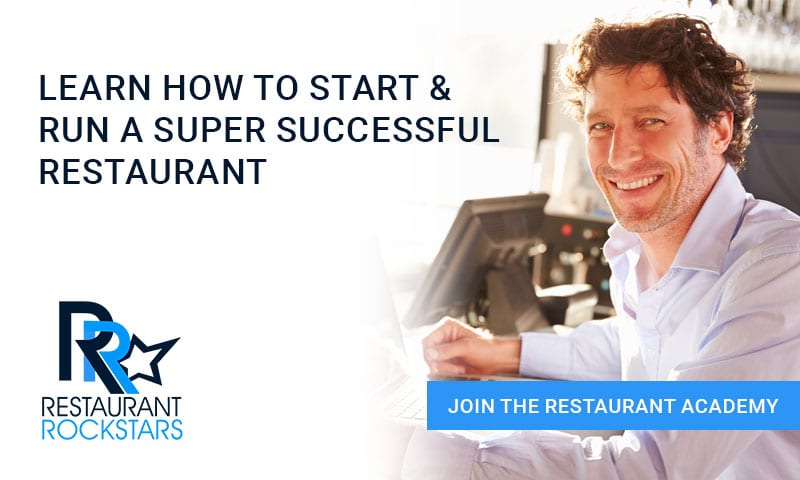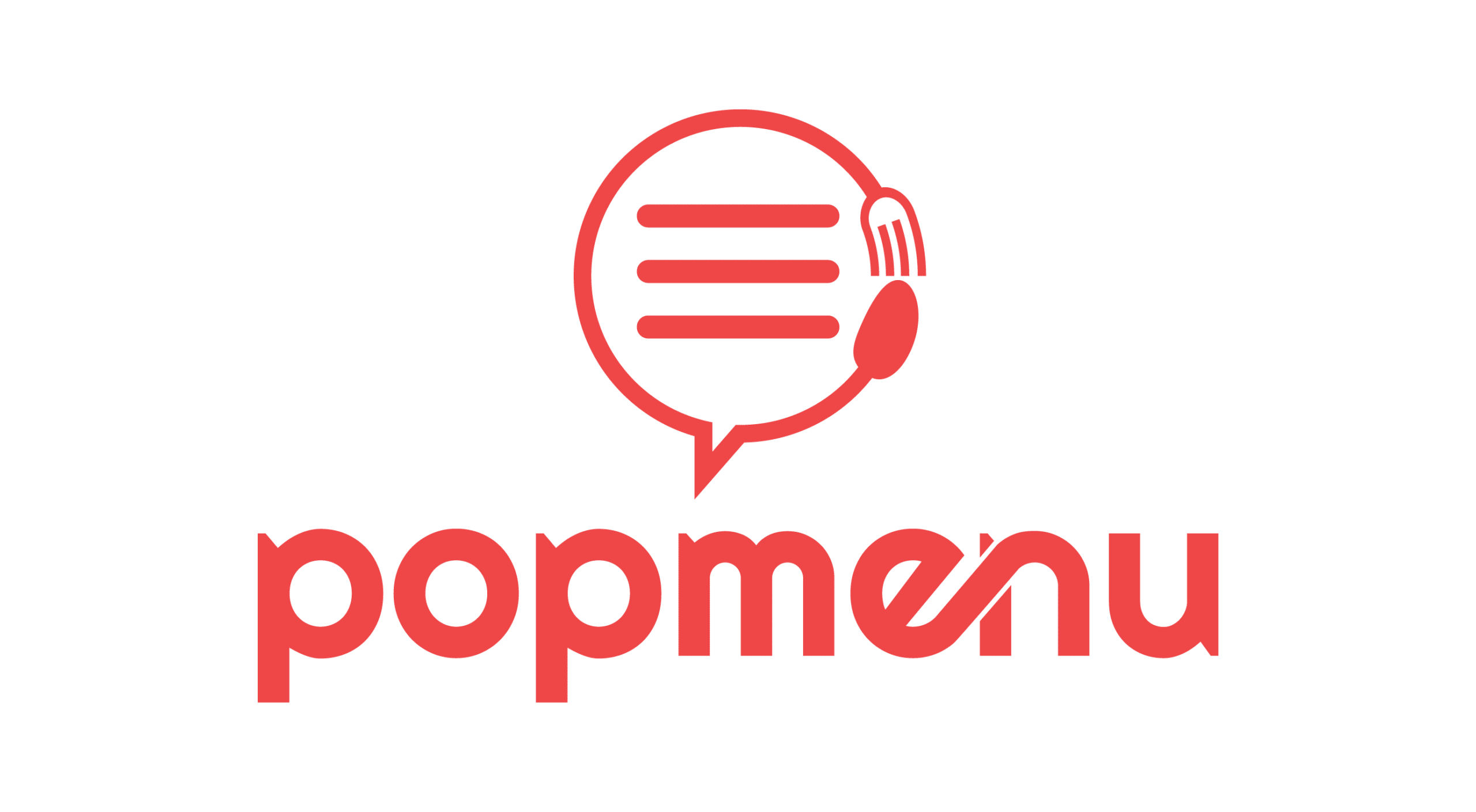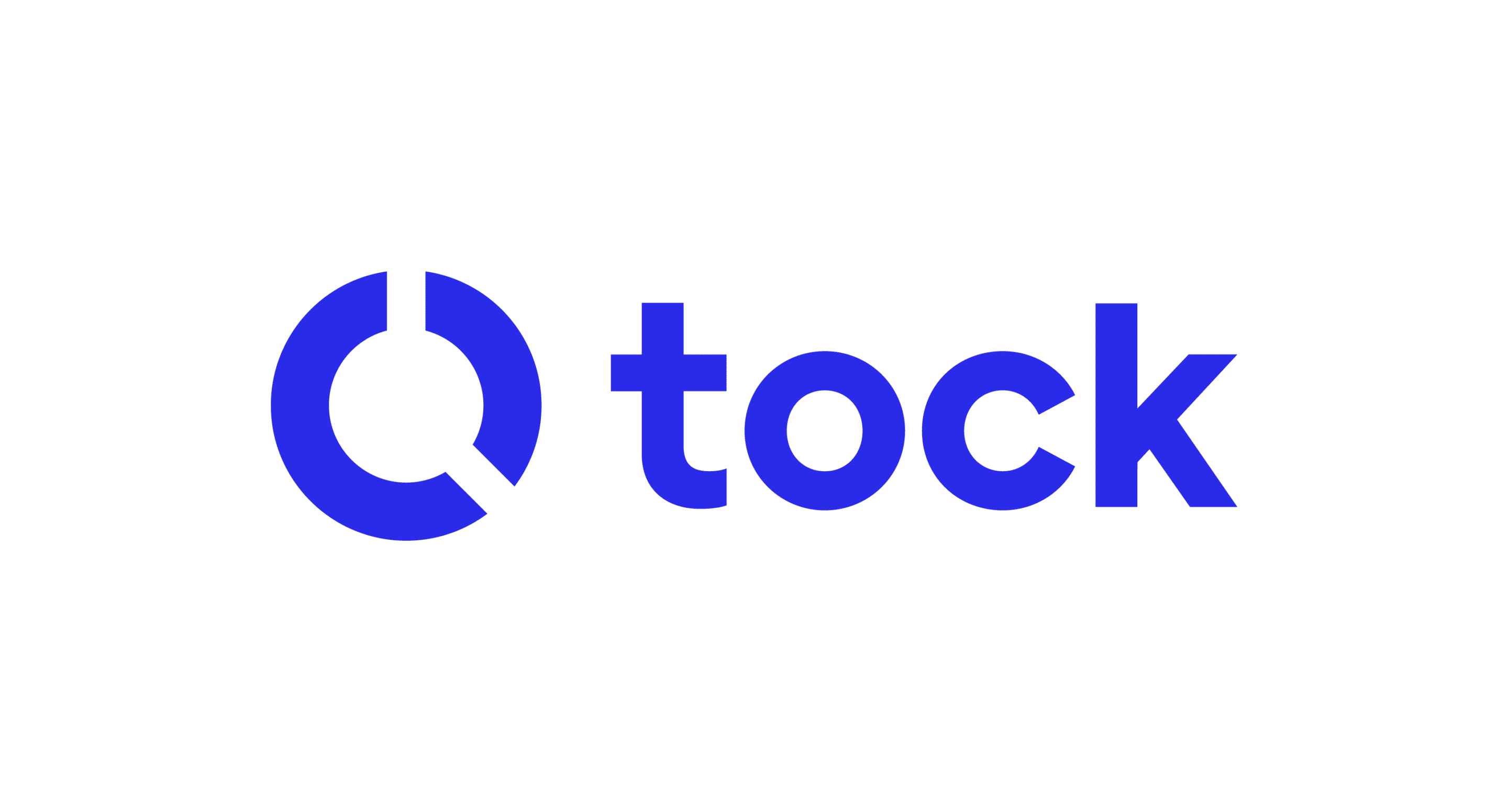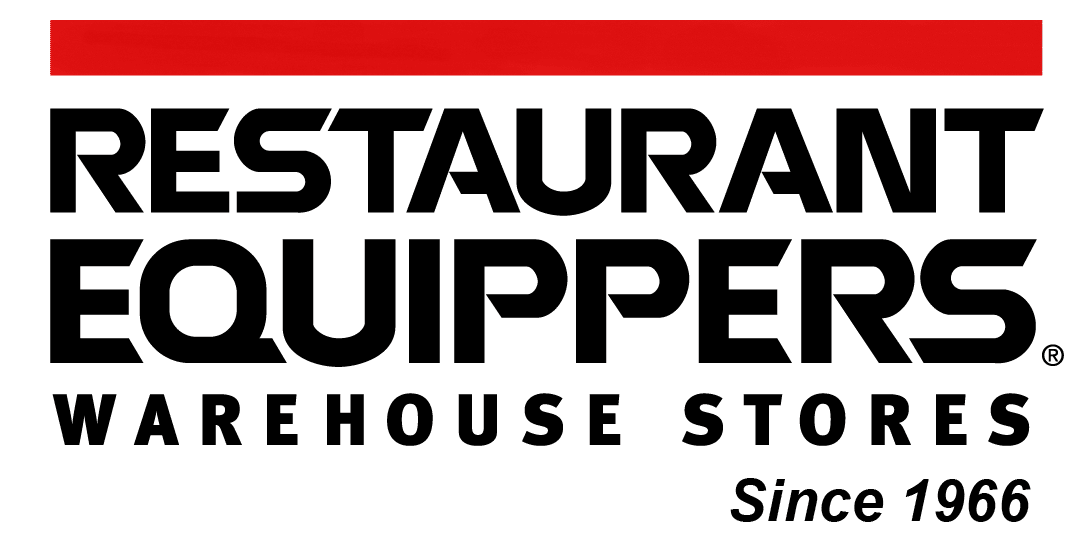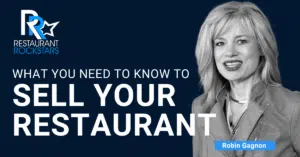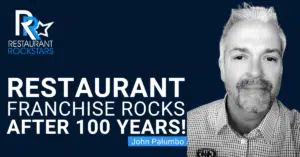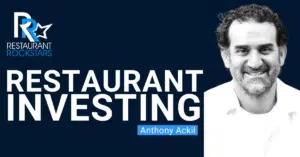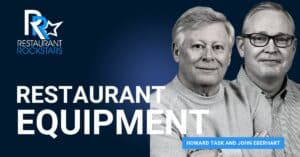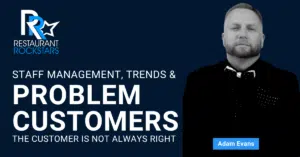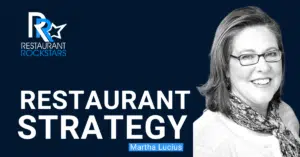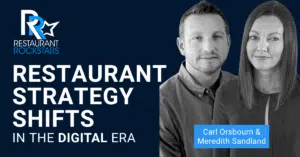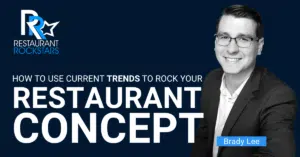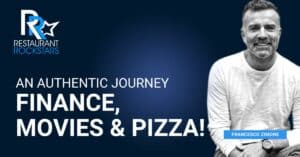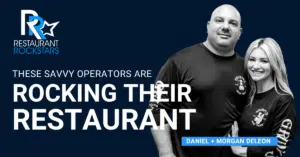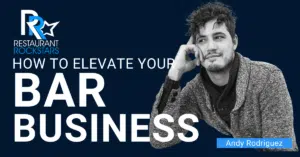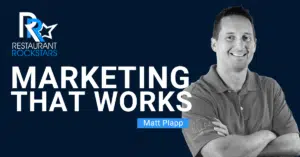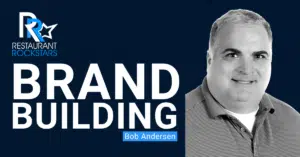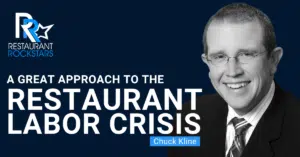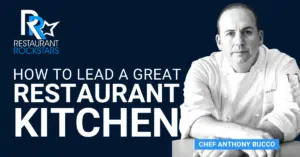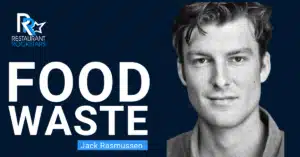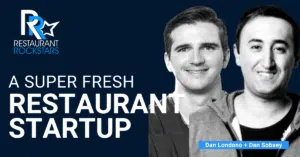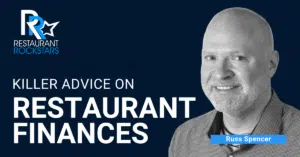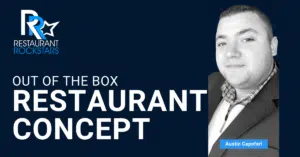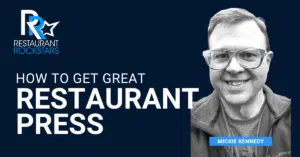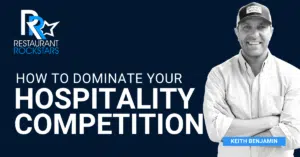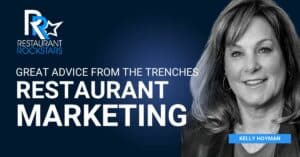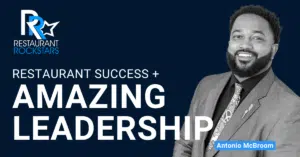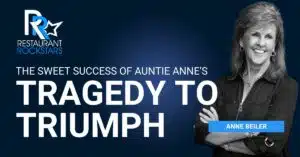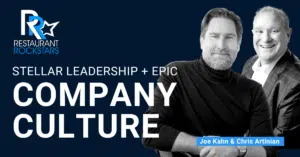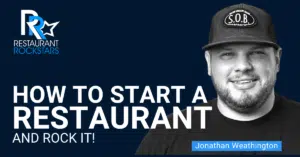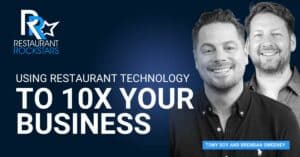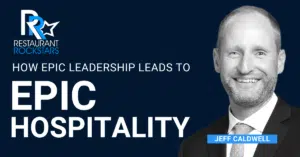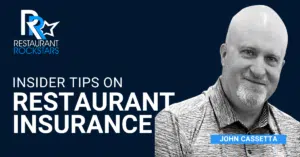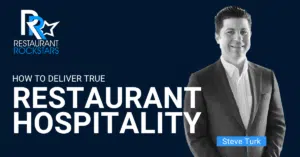Restaurant Rockstars Episode 377
How to Increase Restaurant Sales & Build Guest Loyalty
LISTEN HERE OR ON YOUR FAVORITE PODCAST PLAYER
Every owner and leader wants and needs to increase restaurant sales.
Success here requires many things… efficiency, systems, excellent service, but most of all engaged loyal guests. Here’s where all the power lies.
Guests want to be recognized, acknowledged, and served. Providing this at a high level requires a well-trained staff and seamless technology that makes this process simple, but authentic.
In this episode of the Restaurant Rockstars Podcast, I’m speaking with Matt Tucker, who heads up Tock, a hospitality tech platform that optimizes restaurant sales, throughput and guest satisfaction.
Listen as Matt explains:
- Today’s biggest restaurant challenges and solutions
- What dining guests are looking for in any restaurant they choose
- How restaurants can leverage data on guest preferences to provide personalized hospitality and build loyalty
- How to achieve guest engagement
- Ways to optimize reservations, turn the tables and increase restaurant sales through pre-paid events
- How a restaurant can experiment with multiple guest experiences even at different tables
- Easy set-up, quick onboarding and dedicated hospitality professionals at your service
And how to drive demand and increase restaurant sales when you need it most with the Tock Platform. See it all with a free demo at https://www.joinTOCK.com/podcast
Don’t miss this episode, get my FREE “Top 3 Ways You’re Killing Your Restaurant Profits and a bonus at www.restaurantrockstars.com/profits then go out there and Rock YOUR Restaurant!
Roger
Connect with our guest:
https://www.exploretock.com/join/
Linkedin: @tock
IG: @exploretock
X: @tock
Welcome back to the podcast. So glad you’re here. Today’s guest, Matt Tucker is the head of a platform called Tock and Tock is really changing the way we increase sales while also enhancing guest engagement. It’s all about pleasing our guests. And optimizing throughput. Now, Tock does many things, but we’re going to Tock a lot about reservations and the reservation platform that allows you to really optimize guest counts and even create experiences for your guests, whether that be wine dinners in a five star fine dining place, or even sell prepaid tickets in advance to sporting events if you have a sports bar.
Again, it’s about engagement, it’s about convenience, it’s about Building loyalty with your guests and really giving them amazing dining experiences. So that’s what Tock is all about. So stay tuned. Thanks to the sponsors this week. Thank you for tuning in. And also if you haven’t already, head on over to restaurantrockstars.com/profits. I’m giving away three ways you are killing your restaurant profits really thought provoking information that’ll help you increase profitability in your restaurant. Plus a bonus. A free restaurant assessment, whether you have, again, a full serve restaurant or a fast, casual or food truck, doesn’t matter.
There’s two different versions available to you. And it is a series of thought provoking questions. Are you doing this? This is how you should be doing that. And again, it’s really going to optimize your operation. Now on with the episode.
i You’re tuned in to the Restaurant Rockstars Podcast. Powerful ideas to rock your restaurant. Here’s your host, Roger Beaudoin.
Let me tell you about Tock. Tock is changing the way hospitality businesses do business. Our industry’s constantly changing, but Tock’s industry first reservation platform empowers restaurant partners with the tools and support they need to adapt and thrive. With more than 500 years of combined industry experience, the team at Tock takes great pride in applying their knowledge to solving the toughest problems faced by hospitality businesses.
That’s why Tock shows up every single day, from flexible reservations to a first in class no show elimination suite. Tock continues to innovate and evolve their product to equip restaurants with everything they need to bring their vision to life, now and in the future. Think of Tock as a virtual marketplace that showcases everything in one place.
Restaurants can easily turn a table, a meal, or even a Tuesday night into an experience that they can sell and market on Tock, driving revenue to every corner of their space. Ask a Tock customer what they think about support, and they’ll rave about Tock’s dedication and commitment to hospitality. Tock has been actively championing the restaurant industry for a decade, and they’re just getting started.
Request a free demo today at exploreTock.com/join Again, that’s ExploreTock.com/join.
Rockstars, take it from me, as a former satisfied customer when I owned restaurants, Restaurant Equippers has built lasting relationships by serving independent food service operators just like you going on 60 years. They maintain an extensive inventory of equipment by all the top names at their huge warehouse stores in Ohio, Michigan, and New Jersey.
You’ll find everyday low prices in their stores by shopping equippers.com or by calling their National Order Office at 800-235-3325. Restaurant Equippers experienced specialists are standing by to help you get the best equipment and save dollars. Need it now? Thousands of name brand products are available for immediate store pickup or shipment.
Restaurant Equippers is a family owned business. When you need something, you need it now so you can be assured they’ll make sure you get the equipment and supplies you need when you need them. Have a unique need? Check with their specialists. Restaurant Equippers shops the world to find the best products and value at a price you want to pay when you need it.
Are you building or remodeling? Give Restaurant Equippers a call for all your equipment and supply needs or check their website, equippers.com.
Welcome back, everyone. This is the Restaurant Rockstars podcast. And with me today, Matt, how are you? Thanks for being on the show. Hey,
Roger. I’m terrific. Thank you so much for having me. Really looking forward to the conversation.
Yeah. As we were just saying, our goal here is to bring new technologies and new ideas to the table so that our audience can make informed decisions about how they can improve their business.
But before we even go there, it’s like they know that I usually start with, what’s the backstory of my guest in hospitality? Where did it begin for you?
I Roger, it probably began when I was a teenager. I have had a lot of roles in hospitality. Not all those roles are particularly interesting, but Busboy, barback, bouncer, I guess that’s all the Bs.
Yeah, awesome. Server, very briefly most of my hospitality experience inside of restaurants was in my hometown of Washington, D. C., and then my college town. in Ann Arbor, Michigan. Fond memories of everything from serving both happy and disgruntled guests and carrying kegs of beer around bars and a bit of a different experience than some folks.
But I enjoyed it. I have very fond memories from my very earliest days of being in the industry and some incredible restaurateurs and proprietors that I could still remember very fondly, literally decades later.
So we Tock about enjoyment. This is a business of passion and you obviously enjoyed your early experiences in the business.
Did you always know that you wanted to stay connected to hospitality in some way? Have you done other things outside the industry and then you came back to it?
I guess I came back to it in many ways. I’ve been a technology entrepreneur for decades since the late 90s starting very much outside of the hospitality business.
So my first startup was a company called LendingTree, which is the mortgage I’m totally
familiar with
LendingTree. Yep. So I was on the founding team of that company many years ago, worked with an incredible, dynamic, brilliant founder, a guy named Doug Lebda. So that really set me on my course in the technology industry.
From there I started my own supply chain software company that was acquired. And then while I joined Tock a little over a year ago for the, basically for 10 years prior to Tock, I was the president and chief operating officer of a company called Ola, which served a very different part of the market, casual dining, chain restaurants.
That really brought me back into the world of hospitality from my youth back into my current my current technology roles. So a bit of a foray into other industries, which quite frankly, I enjoyed a lot. I like learning about new industries, new verticals. And I like the technology side, of course, of the business, but thrilled to be back in hospitality and restaurants and Tock as customers and in hotels and vineyards and wineries that were, we serve a lot of sub verticals in hospitality, but yeah it’s great to be back.
It’s a. Special industry. And I know, that
growing company as well. You guys are fast growing at lots of users, which sort of begs my next question. The pandemic devastated our business. We don’t need to go back there, but those restaurants that obviously survived and now they’re really trying to increase their successes and their profitability and all that sort of thing, despite industry challenges, what are some of the current challenges that your customers are still facing today?
No doubt. We don’t want to spend too much time dwelling on the pandemic. I was not at Tock at the time. I was at Olo and we dealt with it very differently. But I want to give the Tock team that was there at the time, that’s still at the company today. A lot of credit because in the fine dining world, Roger, as typically it was not a to go business.
There was no takeaway. And they had to pivot to creating a delivery and pickup product to Tock. at the height of the pandemic. And I think that while I can’t take any credit for it whatsoever, it just goes to show the Tock is continuously, since its beginnings inside of Alinea in Chicago, has been incredibly innovative and incredibly reactive to the needs of the restaurant industry.
And What became a takeaway or takeout business now has gone back, fortunately, into dining inside the restaurant. But what has happened in the couple years since the pandemic is that the rush of guests to go back into restaurants, which people were, of course, were dying to go back into restaurants, dying to get out of the house.
Exactly. Yeah, we saw an incredible rebound post COVID. Now things are starting to slow down and this is not an original story. I know you’ve Tocked about it before. You see typically in our data the same number of covers as you did in 22. And I’m comparing 23 numbers now. I’m not Talking about 24 yet for obvious reasons way too early, but 23 numbers leveled off, right?
The number of covers you see the post pandemic rush of diners decreasing. So cover count was not dissimilar from the prior year, but total dollars spent per diner did decline in 23. And that’s led us to think about ways that we can work with our restaurateur customers to get diners back more often, to create unique and different things inside their restaurants, provide them the tools to do that very easily.
Those are things that we’ve focused on with our restaurant customers.
Excellent. Okay. That makes sense. That’s a perfect answer. How about let’s Tock about today’s dining guests. What are they really looking for when they choose a restaurant one? And what do they expect from the experience once they get there?
Unless they’re extremely loyal to a restaurant, which many people are. They have their favorite places, but a lot of people like to try different restaurants. What are the guests really looking for? And, what do they expect?
I think, returning guests or repeat guests expect one thing and new guests expect something very different.
I think returning diners, repeat guests expect consistency that they’re used to. Now, the consistency doesn’t mean the same product every time. Quite frankly, it can mean just a different type of creativity from the chef, that they always know the chef is creative in what they’re plating and what they’re putting out for the diner.
But it could mean a consistency in a food product as well, consistency in the interaction with the staff, from the front of the house folks to the servers. It’s super important that when you return to a restaurant you’ve been to a lot, that they know who you are, that they know your preferences.
Those things are important and those things lead to repeat visits, but they’re oftentimes, enough to get the diner to come back on a consistent basis, but not enough. And so you need to create new and unique things to drive repeat visits for new guests. I think that a lot of it is. Yeah. Reputation of the restaurants and how popular it is, and do they have products that you can’t get anywhere else?
Is it an experience that you’ve heard about from your friends, your colleagues, your neighbors that has Got you interested in going to that place in the first time, it’s for the repeat guests. It’s like Cheers, or I know you ran a great bar up in up in New England, Matterhorn, you have your regulars and you know them by name.
Oh yeah. That Cheers formula. It is the Cheers formula, right? But that is something that is really, it’s something that the technology companies can help with because we could provide you with a easy access to the guest data that you’ve really created on your own, but that’s yours formula.
It can’t be formulaic. It’s got to be genuine. So you’ve got to not rely on the technology, whether it’s Tox or anyone else, but you have to balance out the technology and the data that you’re staring at and looking at and getting consistency, getting all the time with the constantly is what I meant, getting all the time with the ability to stare the guest in the eye and to provide that level of hospitality.
So technology is an enabler and enabling you to get guests to come back more and more.
Is it a challenge to get the staff to authentically deliver an experience using some of that data driven information that we know what guest preferences are, and we know birthdays, and we know people by name, and it’s it’s right there on the screen, yet you don’t want to appear like you’re reading it off the screen.
It’s got to be a genuine, Hey, Jack, how are you today? And how’s Martha? It’s is where’s the balance there? Is there one? And how do we leverage that? And give genuine experiences where people feel like they’re touched in a personal way without losing the, the personal nature of
it.
Yeah, no, I hear you loud and clear. It could certainly be an authentic, Hey, Matt, great to see you again. And maybe you’ve never seen me before. You just read it in the guest notes. Huh. Yeah. It really depends on the type of restaurant you’re going to. For some people it’s truly authentic and I’m not sure you could teach that to servers, right?
They have to be. People and I’m, and I’m hopeful that we haven’t lost all those people because of the pandemic. And we lost a lot of restaurant workers during the pandemic, some of whom had decades of experience and passion for the industry, but had to leave the industry because they had to, afford to live.
And you can’t be robotic about it. Now, the best restaurants, whether three star Michelin restaurant or, just an upscale neighborhood casual restaurant, they can both have that authentic interaction with the guests. You don’t have to stare down at a screen. First of all, if you don’t know who’s coming in, you can prep yourself before someone walks in.
Okay, I know that Roger’s walking in. I don’t want to create an inauthentic experience, but I could at least say to him, Hey, thank you for coming back. Or I see that, I see that it’s a special occasion for you, but you can do it in a genuine, authentic way. You shouldn’t be robotic and looking down at a screen.
And we’ve had that situation occur. So we can provide the tools to the restaurateur and to their staff. That doesn’t mean the tools are well used necessarily all the time, but I was at a Great Tock restaurant last week in Chicago called Ever, which is quite well known. And, I had a non alcoholic beverage pairing and one of the drinks they served me, I think it was like a sparkling apple cider with Sorel in it.
And I downed a couple of them. They were so delicious. Now, the next time I walk in the door. If they serve me one of those, as soon as I walk in and say, Hey, we noticed that you really love this the last time you were here, I, I know that they’ve looked at the guest notes, but I would find that authentic and nice.
That’s personal, right? It is personal, right? I understand that you probably didn’t remember that, especially if I come back a month later, but I do appreciate that you took the time to try to figure out something about me or that you sat me in a. in a booth that I like, or in a direction that I like, or that you saved, the last tomahawk chop for me, because I always have that when I come to the door.
So I hear you loud and clear. Done poorly, service is awful and inauthentic, but done properly, you, you can’t beat it.
We’re Talking about engagement now. We’re Talking about guest engagement and affinity where you’re trying to create an experience that creates a repeat visit that makes people feel special, even if they’re a first time visitor.
And that’s hard to deliver consistently across multiple team members that might interact with that guest. However, if people are well trained and if they make friends with their guests every night, chances are if that person comes back, they’re going to ask for the person that delivered. An amazing experience.
These are all things that are part of pre shift exercises and training and all that. And in conjunction with Tock technology, with the guest preferences, you can put together some pretty authentic training that delivers what I call true hospitality, right? Without making it as pure canned or just made up somehow.
Oh,
absolutely.
That’s our goal. Engagement is our goal. To lead to repeat business and affinity. There you go. Bottom line. It’s that’s what we want to do in our restaurants. And you’re giving people the tools to do that. That’s
- I totally agree. That is it. We are a provider of tools, right?
We’re not here to tell you how to run your restaurant. In fact, I think we were guilty of that in the past a little bit saying this is exactly how you should run your restaurant and Tock today is very different. We’re saying, we don’t know how to run every type of restaurant. We are going to give you as many tools as possible to create the greatest experiences.
Now that could be just a regular dinner that you’re providing, or it could be a unique experience, but provide the tools for you. You’re right. You may want to match that up with, certain staff. Okay, so I actually, I’m going to plug another company I’m on the board of called Seven Shifts, which is a
I’m familiar with Seven
Shifts.
They provide scheduling. They’re a labor management tool. So you could use Tock, you create experiences and reservations and all that stuff. But yeah, you may want to look at some other tools like a labor management tool to say Okay Roger is brand new here, and this is a very special experience that we’re putting on, or it’s just Valentine’s Day or Mother’s Day, so maybe Roger is going to get, one two top tonight and not, the center tables here, or the, the certain counter that we want you have to think about that.
Holistically about, what service looks like and what tools, what technology tools are going to be additive to the experience for the guest and additive to the labor inside the restaurant. What’s going to help people serve better and enjoy their meal more. Do you travel much
in your role at Tock?
I travel all the time. I live in New York. So you’re eating out
quite
often, right? I am yes. My stomach thank God you can see it in the video, Roger. It’s, it is growing, unfortunately. But yes, I eat out all the time.
Okay, so with that said obviously you try to visit your customers, your users, as often as possible.
But when you go to a non Tock restaurant, perhaps. Are you finding real hospitality there? Are you seeing challenges? Being in this business, being a passionate restaurant guy that goes way back, that kind of knows behind the scenes what happens in restaurants, we tend to be closer to it. We are very critical of experiences when we’re not the ones providing them, right?
I do it too when I eat out. And it’s there are a lot of restaurants out there that are not running on eight cylinders, that are not training their staff every day, that are providing lackluster experiences, like wondering why they’re not filling their seats and they’re not getting that repeat business.
Do you see that much across the country?
I do. I really do. Yeah.
Yeah. Not that any of our listeners are any of those restaurants, but it’s like the bottom line is it’s hospitality driven. It’s like we, we live to serve our guests. People want to be recognized. They want to be acknowledged. They want to be served.
And my goal was always to treat every guest that walked through the door as if they were an old friend or not a first time visitor. And my goal was to train my staff so that we could provide them with experiences that were memorable, that would make them want to come back and tell them about all the things we knew they would enjoy and appreciate.
And that increased sales. And that was a piece of hospitality. And I’m glad you’re saying that because, this is something that, that we want to shape the industry. We want to provide tools to restaurants to help them succeed. And these are foundational ideas and elements that will help them do just that.
And I know that And we’ve already said that you guys are innovative I hate cliches, but I have to bring this up. And you made me think of this because I don’t know who made up this saying, but we’ve all heard necessity is the mother of invention. And knowing what your team knows about the hospitality business, you’re always on the lookout for the next big thing that’s going to move the needle for business to improve it because whether the customer, the restaurant operator knows it or not, they need this technology.
And there’s always new stuff coming down the road and you guys continue to innovate. So I’m really excited to get into what Tock does and all the different, where did it start and what was the first product and then what led to the next product and let’s go through a roadmap of everything you do.
Yeah, sure. But by the way, I want to just give you a hat tip to your podcast, because it’s quite possible that your listeners do not provide that poor level of service. Why would they waste time listening to a podcast about how they can get better inside their restaurant if they’re not interested? And I have had some really poor experiences, and you struck a nerve there because I had an awful one this past weekend.
I know, I’m not saying still happen, it still happens. And it’s really unfortunate and it’s just it knocks you back a little bit because, we take pride in the industry that we’re part of and the industry we serve. And when you see it done poorly it’s. It’s really bad. Anyhow
It’s bad for many reasons, but it’s think about before social media and online reviews, right?
It was word of mouth back then, which was damaging enough, but now that any customer has a bad experience, There’s still a lot of people that won’t complain in the restaurant. They’re just going to wait until they leave and then slam a restaurant on social media. And then, damage control is so important.
And there’s a lot of restaurants out there that don’t respond to the reviews, positive or negative. And that’s an essential today. And putting a spin on something that’s authentic, where we recognize we might have made a mistake and we want to make it right for the world to see, not only to get that customer back, but just to show the world how we respond.
Human error is always there. It’s like people make mistakes. Things are going to happen. Not every meal is going to be perfect in a restaurant. We want the opportunity to make it right while the customer’s there, but so many people aren’t going to bring it up. They’re just going to leave and chances are they won’t come back again and they’re going to slam you and that’s a dangerous thing.
It is a dangerous thing. So that’s an art in itself, how we deal with this. And not every restaurant is adept at dealing with that, but that’s right.
Technology thing, right? Like you could have as much technology as you can afford, but it won’t help you have a. Genuine connection or it won’t help you if you’re completely disinterested in serving the guest and think it’s a burden.
And if you’re not in service of the guest, it’s really obvious. And it’s it’s unfortunate, like I said, but to go to the other extreme, I’ll go back to the Tock. Yes, please do.
10 years now, right? Is it 10 years?
Yeah. A little over 10. Tock started inside a restaurant, and, it was, and is, one of the best restaurants in the world, Alinea in Chicago.
Yes. And Tock was started by Nick Konas, who’s You know, one of the owners of Alinea and the Alinea Group, their other restaurants, and, Nick had a very unique perspective, because prior to starting Alinea and the Alinea Group, he was a trader, and so he knew, he thought about reservations very differently, I think, than the rest of the restaurant world in many ways.
He thought of them as an expiring contract. And he saw value in that contract. And so that comes from his trading days. At the same time, he saw this sort of significant issue of no shows. And he basically said why don’t we just do prepaid? Reservations. And that was the core initial innovation behind Tock.
Now, our competitors have tried to knock us off, but they have not been able to. We are still the best provider of these prepaid reservations, but the genesis, the idea, as I described, thinking about a reservation as a contract, which Nick did. And his brilliance in thinking about, this no show issue.
And we were able to take no shows from, in the 20s down to very low single digits because, what Nick said to guests was basically, listen, you’re going to buy a ticket for a sporting event. You’re going to buy a ticket for a movie. A movie, a
concert. In advance online,
of course.
Exactly. Hey, guess what? We have significant labor costs. We have significant food costs. We have real estate costs. And we have high demand, so you’re going to prepay. And in many ways, that kind of simple Insight was really genius. Genius and innovative And
yeah. ’cause think of the lost money there when a reservation is made and then the people do a no-show.
And how long do you literally wait for those people to come in before you try to give the table away to someone else who’s a walk-in? Or if you’re known as a reservations only place and you don’t have any walk-ins, now you just lost that table turn. You got it. It’s wow. That’s horrible.
That’s horrible.
So in many ways, Tock was originally conceived not as a reservation platform in a sense. It was a revenue management platform, right? Like, how do you think about the value of that table, of that cover, of that time slot? And, it’s just a different way to think about, The world of restaurants and the Genesis was in this incredibly difficult restaurant to get into in the fine dining world.
But yeah, what I’m really proud of is, innovation did not stop there. I still think that we are by far the most innovative platform out there. And quite frankly, we need to be because You’re gonna, we’re not writing checks to get inside of a restaurant and we just need to be better, smarter, more innovative.
That’s how we win business. And that is different from our core competitors. And so we count on innovation. We count on the hundreds of years of restaurant experience that we have inside our team. We have engineers who have been sous chefs in Michelin star restaurants. We have people in our customer success and hospitality team who have been general managers of restaurants and servers in restaurants.
And They comment on the products and they comment on the, everything. So we have this incredible DNA inside the company. It started with Nick, it started inside of Alinea, and it has spread far beyond that. And so we continue to innovate and that’s the reason why I’m here.
Honestly, if we were just resting on our prepaid laurels, then it would not be particularly interesting.
Four restaurants by restaurant people. Hallelujah to that.
Yeah, exactly. It’s just, we’re a different company. We’re not trying to market to the guests. Everything we do is in service of the restaurant.
We are not disintermediating the restaurant and their guests. We are not taking Roger’s information. And then reselling it, remarketing it, trying to steer you away from the restaurant you want to go to, trying to sell you another product. We are creating tools for the restaurateur that will allow them to connect better, hopefully as we were discussing, in an authentic way, with their guests who walk in the door.
So interesting.
I want to dive a little deeper into prepaid experiences. When we go back to my experiences with the Matterhorn and other restaurants, we were at a ski resort, and we didn’t take reservations. We were first come, first serve, and we were hugely popular. Lines out the door and, phone ringing off the hook and all that crazy stuff.
But it got to the point where people would offer us 500 just to take the reservation, just to guarantee them a table. It’s Saturday night at 730, I’ll give you 500 bucks just to give us a table. It got crazy, right? And that would happen fairly frequently. What is the cost of a prepaid experience and how does it work exactly?
And how far in advance does someone need to book a reservation in a typical Tock user experience?
There’s no typical Tock user experience. We are not we’re a tool, Roger. You can use us how you want. How, one restaurant that’s fine dining, that does, all their reservation releases the first Monday of the month, and they’re gone within five minutes, how they use Tock in that way could be very different from, a more casual dining restaurant.
in a suburban area that, is not even doing prepaid. We released credit card holds, late last year. So maybe you just want to do a credit card hold. There is no singular thing that we are focused on. Fertility
then. You can use it as
it works for you. That’s exactly right. Now again, like that, I think, was not always in the DNA of the company.
I think we wanted to be prescriptive because we had a sense of what a well run, managed restaurant looks like. But I think that those ideas are No longer appropriate that we must create tools that go across all different restaurant types. So if you want to pre book an experience, we have a winery that was pre, was pre booking experiences for a summer this coming summer solstice last year.
And they sold out almost immediately. We have other experiences, that people are creating that are, almost immediate, you could have an experience that. Any table, any night, you could just, you can serve your regular food and you have people come back for that all the time.
That’s fantastic. You could also take a table and test something out with our new multi experience table product. And so when you’re in the Matterhorn, you could have said, okay we have a tent top and we’re going to make it a family style meal, but if we don’t sell it out, we can also just show it as a regular reservation and, let’s see what books first.
So you don’t have to hold it aside. So we’ve created, lots of. That’s where you can find all of our dynamic features inside our products that allow you to do whatever you think is appropriate on whatever night of the week, what, or whatever day part, whatever day of the week wherever you are, because by the way, in the Matterhorn in the summertime, may have been a very different thing.
So people are fighting each other to get it in the winter. If you were open in the summer, it’s probably a little less crowded there. So you bring it in. If I did my research properly, you created a mug club, right? Which is a brilliant idea. So you have incredible beers and you get people to come back and, buy these mugs.
It looks like year after year, it’s pretty, pretty special.
Running a restaurant is a marathon of management. You’re constantly managing customers, employees, vendors, menus, marketing, and the list goes on. But don’t forget the essential element, managing inventory, a crucial factor that can make or break your success. Listen, Sculpture Hospitality is the secret ingredient you’ve been missing.
They don’t just manage your food and beverage inventory, they blend expertise with technology. They take your inventory, sales, purchases, everything, and transform it into a roadmap for your restaurant’s success, painting a vivid picture of your profitability. Their range of service options will meet your needs and your budget.
Are you looking for a hands on, full service solution using one of their inventory experts? Or do you prefer sharing inventory responsibilities? Or even a self service option? Well, Sculpture Hospitality Services are like a customized menu. Take charge of your bar or restaurant inventory today. Get a free, no obligation, inventory consultation from Sculpture Hospitality.
Visit SculptureHospitality.com/rockstar and discover their inventory solution that matches your needs, your budget, and your success.
This year, give your team the gift of PopMenu AI Answering, a simple solution for phones ringing off the hook. AI Answering handles calls 24 7, 365 days a year, so your staff can focus on in person guests.
Customize your greetings and responses. Answer common questions. promote specials and events, and send follow up links to ordering and reservations. AI answering handles it all, while escalating more complex conversations back to your team. Now, never miss another tasty revenue opportunity. PopMenu is the marketing technology platform designed to make growing your restaurant easy.
Discover more A. I. restaurant tools that turn your to do list into an already done list. Request a demo today and my listeners for a limited time will get $100 off their first month, plus lock in one unchanging monthly rate. Go now to popmenu.com/rockstars. Again, get $100 off your first month
Yeah, it was beautiful in many ways because we had the upfront cashflow of the memberships. So we would sell a mug for 55 bucks and we were a seasonal business. We weren’t open in the summer. So people would pay 55 for the winter season to have their.
Personal mug, it would stay on site, all that kind of stuff. And it became this sort of affinity builder where if people used to come in maybe twice a month, now they belong to this mug club and now they’re in two and three times a week. So it wasn’t just the membership fees that was the cashflow generator.
It was the amount of increased spending because people came more often. And that was a beautiful thing. That was a foundational element of one of the reasons why it was so successful. And then it sold itself because people that belong to the Mug Club got their friends and their family and their relatives to join because it was one big clubhouse.
And there’s that cheers formula again. So yeah, I recommend that to anyone that serves draft beer and even coffee shops can do Mug Clubs. It’s just a loyalty builder.
It’s a loyalty builder. I think some coffee shops are doing that. Some of them have all you can drink coffee at your own mug club.
It’s a great idea. Anyone who has draft beer selection, like you guys did there it’s a brilliant idea. But again, like we, we’re a technology company at Tock. We can’t create those ideas. We could provide you the tools to run the mug club. You didn’t do it on Tock, but, theoretically you could. So we have plenty of restaurants that sell Products like mugs, not just reservations, we want to provide the tools that make sense for your season.
We do a lot of seasonal business. We have a lot of ski resorts on Tock, so it’s something they can easily replicate today, but we can’t come up with all these ideas.
So event ticketing is one of the things, and then if you have special promotions, pairings or cigar dinners or whatever it is, you can literally sell any of that stuff on Tock, right?
You can sell it all on Tock. We do a big ticketing business, and so that we could have variable ticketing pricing. We do guest check in, QR codes, integrated with third party printers. We do some incredible ticketing events. We, last year we did Coachella for the Soho House.
And, these are Big events. So the sort of event side of Tock is not something that people necessarily know us for immediately. We are, a diverse technology company serving a lot of sort of sub verticals inside the hospitality industry. And so if you want to create an event and you don’t even have a, a kitchen and within a thousand miles of that event, Tock is still a platform you can completely run your event on.
Let’s Tock about the
current product suite, because we’re Talking about multiple tools here. Is, do you package these things together? Are there a la carte offerings? If I want to do this, but I don’t need to do that. It’s walk us through the different parts of the platform.
Yeah. It’s so we have different types of subscriptions.
Or licenses that you would get from Tock, I’d say on one extreme, the least amount of features would be pretty, basic waitlist functionality. And that you would be used to, maybe you took waitlisted, Matterhorn, maybe not, doesn’t sound like you did, but that’s something that if you don’t do reservations at all.
that we have an incredibly robust product for that we are constantly working on. In fact, I’m meeting with my product team tomorrow about our, some of the waitlist features that are coming out that we’re extremely excited about. On the other extreme is our premium unlimited package that has every reservation type you want from prepaid.
To credit card holds and standard reservations, events are on their multi experience tables, a brand new product that we released about a week ago. That’s on there. All our new features that we’re releasing all the time are on that premium unlimited. Side of the coin, but we have something for every type of restaurant.
Again, there is this perception of Tock as serving fine dining that is accurate from a few years ago and not accurate going forward. We serve all different restaurant types. I am very proud of some of the restaurants we have on that, are not fine dining, do not aspire to be fine dining, or just great.
Local neighborhood restaurants that are incredible, sophisticated users of Tock because those restaurants also want that incredible experience for their guests. Want to know, have the ability to take guest notes that, last time Matt walked in, he did so and he asked so and he brought in so and that isn’t just a. Find dining idea may have originated there, but that level of hospitality is pervasive now in so many restaurant categories that it’s no longer the exclusive, area of, the two and three star Michelin restaurants. It’s way better than that. Let’s
Tock about the software itself.
Let’s just say that a typical server or a host just captures some restaurant data from a recent diner that’s just walked out the door. And now we know that person’s likely to come back. Are we entering them into some type of a database? Are there fields that are pre populated that just prompt you to easily fill stuff in?
Or is it simply just notes and you type away and you put in as much info as you can? Like, how is it organized?
There’s, so some of it is unstructured notes that you could put in that don’t necessarily fit in some easy category, but a lot of our data is what I would call structured data.
So it could be, the type of Food you’ve ordered it’s pretty, you don’t need an open text field to describe a menu item. You can pull that in directly from the point of sale. I have integrations with lots of different point of sale providers. So if Roger is walking in the door of a Tock restaurant, where we have an integration with the point of sale, I already know what you ordered.
I know when it was fired to the kitchen. I know it was brought out. I know how quickly you got the check and how quickly you walked out the door, which may be important and may not be important for your next visit. It may be that you like to linger at the table and that’s absolutely fine, but I have that in my notes and, maybe I think about that as you’re walking in and I put you in a certain table or with a certain server.
So you can input as much information as you want, but the structured side of the data is more important because it’s easier to look at as someone’s walking in or before they walk in, but it really varies, by restaurant type. So some restaurants have servers. Between courses and after any guest interaction, some of them come back and start typing notes directly into Tock.
For all sorts of reasons, and some do it at the end of a meal, or end of service, some never do it. We also can provide our restaurants with notes before someone ever walks in the door. We have certain partnerships where we may know your dining history from other restaurants, or your credit card spend in restaurants, in general.
And we do as much as we can to provide. The restaurateur, the server, when Roger walks in the door, you can do the research I did if you’re a server. You can click on Roger’s LinkedIn and you can see that he was a restaurant owner and that may actually spur really great conversation with Roger when he sits down at the table.
Hey Roger, I noticed you. I love Talking shop. Yeah, exactly, right? Hey, I noticed you ran a great, Your place up in STO or or where you were up, you were in New England somewhere? I were you still Sunday River? Yeah, it was Sunday. Sunday River. Oh, okay.
Sunday. There is a Matterhorn at Stowe, so there’s some confusion there.
Okay, got it. And that place came before my place, but my place, I believe, was more authentic as it was really based on my experiences climbing the in Switzerland,
oh, that’s amazing. That’s a beautiful spot. I have not,
if you’ve been to Zermatt it’s amazing.
I have, it’s amazing. Cool. So those guest notes are again it’s, yeah.
It is a, it’s an art how you use them, right? But I think a lot of our restaurants do like to capture as much as possible. A lot of our chefs and our owners of the restaurants, they’re going to go into those guest notes and they’re going to go into the reservations before they walk in the door.
They’re going to see, who are the VIPs and who are the regulars or who’s a celebrity coming in the door. And They may want to send out a special course or a special dish or whatever the case may be. Again, we’re a tool you can use us to enhance the experience for the guest, or you can just let us run the background and do our thing and do, a, a basic job for you.
You guys are big on reservations and table management, of course, but there’s still a challenge with restaurants with people showing up late, or, okay, two people for the reservation are here at seven o’clock, but now there’s a reservation for ten, where are the other eight people? And they’re trickling in, and the inefficiencies of maximizing table turns with reservations, is there ever a solution to that?
You know what I mean? It’s if you could dial everybody in where they walk in the door at seven o’clock, they sit down, they’re there for exactly one hour and then they’re gone and you just kept moving, that would be an ideal situation, impossible, but it’s that’s what we’re shooting for is efficiency.
You’re providing the tools to provide efficient reservations, but the management side of things, it’s the falls on the restaurant or literally falls on the guest walking in the door is still an uncontrollable variable, isn’t
it? It is. There’s, there’s nothing that we can’t create from a software perspective.
If we could, we’d make millions more.
Exactly, but that doesn’t mean we have a solution to that age old problem. And again we don’t feel it’s our job to provide that solution. Again, like this may be a little bit different about how we, what we thought in the past, but we’re, some restaurants are probably going to drop a check before you even get your dessert course.
And some wouldn’t think in a million years of getting you to move. Any quicker than you want to move. And it’s really up to the restaurant. So we can That’s that balance. Yeah.
The hospitality piece Yeah, again, like Without losing the hospitality yet, you don’t, you can’t have campers that are sitting there for two hours, lingering over a cup of coffee and conversation when you’ve got people that want to be served.
Age old
problem. That’s true. But listen, the software is created enough to say, okay I’ve noticed that, we have this camper and they’re always a camper and maybe next time they come in to make a reservation I’m going to show them, a 5. 30 reservation slot.
Cause I don’t mind if they sit for two hours, I could do a, a slower turn in that spot, or maybe a slower turn in the last spot. And you can use, The technology potentially to steer a certain guest to a certain time that may match up better with how long they like to linger or how quickly they get out the door.
But again, we’re not going to say. In any way, shape, or form, this is how you should treat your guests. I don’t think it’s our place to suggest that. I agree.
Yeah. Briefly touched on multi experience tables. Can we dive a little deeper into that? Because restaurants can experiment with different experiences.
Can you give us some examples of what some of these experiences might be just to trigger the thought of our listeners on, Hey, I didn’t know I could do that. And wouldn’t it be amazing if we could do this? And providing different experiences at different tables. In a way that creates this wow factor of guests where, wow, that’s really cool.
And next time I come in, I want to do that versus this, right? It’s there’s so many possibilities here. It’s almost unlimited based on creativity of the restaurateur to come up with experiences and all managed through the Tock platform. How are some of your customers using the multi experience tables?
Yeah, it’s so first of all, for many restaurants. The core meal is what they want to focus on. But, like we Tocked about, Roger, early on in the podcast is, post COVID people rush back into restaurants. Now we want them to come back and become repeat guests as often as we can.
And we want to attract new guests as well who may not know us for a certain thing. And so experiences are great at that. What multi experience tables gives you is certainty that you can put a table up for an experience, but you don’t have to worry that guests are not interested and you’ve held this table and now it comes Friday night and you haven’t sold it because you created this, something really creative and what you thought was really interesting, but guess what?
The guests didn’t. If you’re not really like it, they didn’t book it. Now that table is sitting empty with multi experience tables. You can offer, regular meal at that singular table. You can have, an experience at that table and whatever sells first is what’s going to sell through. So you’re not holding.
Inventory. Gotcha. Now that’s great. And so that, it’s like that dynamic aspect of the table. It’s basically saying, okay, we have this table, we can offer mult a multitude of potential things at that table. Again, from a standard regular meal to, an oyster shucking class or a beer tasting or, obviously a wine tasting or a special chef’s table or we have some just incredibly creative chefs or who do wonderful things.
We’re not preventing that creativity. We’re saying go crazy. And if you could sell that experience for 500 a cover, go for it. But if it looks as though it’s not going to sell, that table is still available for a standard reservation.
That’s the
versatility piece. That’s it. It’s versatility. I love that.
Exactly. That’s the perfect word. See, our marketing people should have thought that. It’s the versatility. I’m going to use that. It’s the versatility of the table. And what does some of those experiences look like? Again it varies greatly. You can take a table in a kitchen.
We have an amazing restaurant down in Savannah Georgia called Brochu’s and, they’ve created in the kitchen, a replica of the living room of the chef. So you’re sitting in the chef’s living room and the kitchen at the same time. Okay, so that’s one experience. If it doesn’t sell out, you could sell it as a regular, chef’s table or whatever the case may be.
Again, you could do something as basic as a wine pairing. I know that experiences, can take extra effort and extra labor. And so we’re not saying that multi experience tables.
I’m going to use your word now, or liberally from you going forward, it just provides you the flexibility and it just, it’s an inventory management tool in many ways saying, okay we’re going to hold this seat for this, or we’re going to hold the seat for that. And we’re going to see what books first, and we’re going to go from there.
I like that. That’s great. There’s an advantage to that, for sure. And we’re all about competitive advantages and doing what the competition isn’t doing and staying on top of the competition, playing our best game, but always knowing what the competition is doing and then offering our innovative experiences that build loyalty, get people back again.
That’s great. But I don’t look at my competition for innovation because they are non innovators. And so my competition is not going to provide the next great product for Tock. We are going to come up with it on our own. We’re going to come up with it by Talking to our customers and Talking to our prospects and Talking to our internal staff who are, From the restaurant industry, I don’t have the luxury of doing anything else, but being the most innovative platform out there because I have, constraints on how I’ll do business.
And, I can’t just walk in the door with a big check. What I can walk in the door with are some of the most innovative products and features that are available to any restaurateur. Anywhere. And I think that is worth a lot, and I think that will, long term, significantly drive up the revenue and profitability for a restaurant, as opposed to hey, let me stroke you a one time check, so you use this reservation platform.
So I think it’s a advantage to be innovative and I’ve never seen Anything but innovation, when in all the software companies that I’ve been part of, innovation is the most important thing. And, we will continue to focus on that at Tock.
Yeah, that’s, that is abundantly clear. And I love that approach as well.
I think when I was Talking about Keeping an eye on the competition, I had my operator hat on, and knowing that our audience is, this is something that our audience should do. It’s like they should secret shop their competition. They should send their team leaders out to keep on top of what’s happening, and then try to always stay ahead of the curve.
And it’s just smart to do that, whether you’re in the tech business or you’re running a restaurant. It’s just stay on top of
it, ahead of the curve. I agree with that. I do use my competitors certainly. And, I don’t want to beat them up unnecessarily because they provide a fine basic product.
Don’t always look To the restaurant industry either. I look to broader e-commerce or ver physical commerce companies as well. I don’t look just inside the US or North America. I always look to Latin America, Asia, what’s going on in those markets, not just inside the restaurants and other hospitality providers, but in the technology companies serving them.
I believe we can learn. Greatly from other e commerce businesses. And we can do things to, provide features that we see in other regions of the world that will benefit our predominantly North American based customers. That’s where I look for it. That’s where I think innovation is happening.
And then of course, last year we created for the first time in TOX history, a product advisory council. Again, like we’re focused now on What our customers are also asking us for. And it’s not just sometimes, by the way, it’s just not technological innovation. Sometimes it’s just ease of use.
Can we have a better, user interface or user experience? Can you make it more simple for our front of house folks who, have high turnover in certain restaurants, right? So just make it easier. Make sure they don’t have to work as hard to, move a table around. And so we focus in order to an amount of time and in many ways, just breaking down what we built over years to say how do we make this easier?
How do we make this something that, a new server, a new hoster hostess. Can get up and running on as quickly as possible. We don’t want to make it harder for our customers to use Tock. We want to make it easier every day.
That’s the perfect segue into the next question. It’s let’s Tock about onboarding and the process and the timeline of, I’m a new Tock customer and I just signed up today.
It’s like how soon before I’m up and running one and too comfortable with it and really adept at using it.
Okay. So those are all great questions. We can get you up, but this is, it’s so funny. I spent 10 years at Olo onboarding, restaurant chains. And so that’s a very difficult process.
And because chains are oftentimes made up of multiple different franchisees, and so that, multiple different points of sale, typically a Tock customer is, one or a couple locations, one particular point of sale. Tock customers should be able to get live on Tock within a matter of a couple days maximum.
Now the average could be longer than that because oftentimes we’re dealing with individual proprietors who are very busy they’re bussing a table, they’re prepping something in the kitchen, they’re ordering their food. They’re trying to figure out who’s going to cover for a table tonight because someone called out six.
So the implementation time is almost solely in the hands of the restaurant customer. They can get up and running on Tock very quickly. How quickly can they get used to using the product? I’d say it’s something that we believe you could get. Very comfortable with within a matter of days and expert on, probably within a couple of weeks.
But again, it’s not simple. We try very hard to hold the hands of our customers to get them. Because if they’re switching from one of our competitors, they’re very used to that product. We are not the same. And we try hard. We have a hospitality team. That’s what the team is called at Tock.
And that hospitality, yeah, it’s amazing. And we have so many former hospitality people on this team. Yeah, exactly. They are passionate. They
understand people’s business and they want to help and it’s like they can provide solutions by virtue of their experience and their passion for the industry. All that combines to give an excellent user experience, right?
Yeah,
I think so. And you could call the hospitality team during service when you’re panicked and you can’t find a reservation or someone walked in like you, it is very different from what else is provided out there. And I am. Honestly, I didn’t build this team. Kudos to Nick and the team who built the company originally.
And, I’m fortunate and happy to be here now. So I didn’t create this hospitality team. But I am so proud of what they do and how they serve the customers and how they think about the customer is not just like a client and they’re paying us this they’ve been in their shoes. They’ve been servers, they’ve been GMs.
When someone calls us in a panic, they can relate to that. And, that’s not just me saying that, that is reflected. And the net promoter scores, if you’re familiar with NPS it’s reflected in the net promoter scores of Tock and the love that our customers have and the thanks we get, we have a Slack channel called Tock love and every day, I get to read the, believe me, I read some negative comments too, but the Tock love channel is just a.
It’s a great elixir for the day. You go in there and you see the love that people give to some of your team members and it’s meaningful. You Tocked about authentic and inauthentic in, in servers before. Yeah, we have the same thing with this hospitality team or account management team. You can be inauthentic and just be rote in your response, or you can be empathetic.
and authentic, and really hold the hand of that restaurateur who is dealing with the situation. We have a kitchen fire, we need to cancel all the reservations, going forward tonight. Can you help us do that? We’ve had that all the time. We’ve had floods in restaurants, and we don’t sit back and say, sorry, you can go, find it in the FAQs of the video.
We’re going to stay on the phone, we’re going to answer your questions, and we’re going to help you get through those hard times. Does each client have a
dedicated hospitality person or it varies, depending on what you
call them. It varies because we have, you can call us, you can email us, you can chat with us and, it, it depends on who you are, how you like to interact with us.
And some people don’t like to call us at all. They just have a quick question, they want to. Shoot an email and get an answer right back. Yeah, exactly. They want to get an answer right back. Some of them want to do self service. They want to go see the videos that we’ve created for the new features and products we have, and they want to spend time studying that.
Then they want to be able to train their staff on that as well. So they want to try to get that knowledge inherent in how they think about using the system and not have to rely on us. So we, again, we’re not being prescriptive on how they work with us.
Fantastic. Oh, Matt, that’s awesome.
Have we covered everything? Is there anything we missed Talking about Tock? Anything else you want to share?
I don’t think so. I’m just first of all, thank you so much for your time. It’s so great to Tock to restaurateur and someone who ran an incredibly successful business and who also climbed the Matterhorn, which is pretty amazing.
Yeah, no, just proud of the company, proud of the people, proud of the the origin story, proud to have taken over for such an incredible guy in Nick Konas, who founded the company and really feel like we are doing incredible things to continue. I know I’ve said this, but I’ll say it again to, be not only the most innovative platform out there, but the one who is the most, empathetic with our customers, the one who has the hospitality team, the one who treats the guest data as the restaurant’s data.
We are not, competing with our restaurants. This is something I learned at Olo, where, we work with third parties like DoorDash they would Compete with the restaurants. They would take that guest data and create a ghost kitchen and now sell the same product that they learned on your back at the restaurant.
We are very concerned with that at Tock as well. And, we want to be a technology provider to the industry, but we don’t want to be a competitor in any way, shape or
form. Excellent. Fantastic. And you can request a demo as well at your website. Is that correct? That is certainly
correct. We welcome it.
ExploreTock.
com. There you go. Awesome. Yep.
And Matt, it’s been a pleasure having you with us today.
Roger, likewise. Thank you. It’s been so great to Tock to you and I really appreciate it.
Absolutely. That was the Restaurant Rockstars podcast. We thank our audience for tuning in. We thank our sponsors and we hope you all tune in again real soon.
Stay tuned and stay well.
People go to restaurants for lots of reasons, for fun, celebration, for family, for lifestyle. What the customer doesn’t know is the thousands of details it takes to run a great restaurant. This is a high risk, high fail business. It’s hard to find great staff. Costs are rising, and profits are disappearing.
It’s a treacherous road, and smart operators need a professional guide. I’m Roger. I’ve started many highly successful, high profit restaurants . I’m passionate about helping other owners and managers not just succeed, but knock it out of the park. I created a game changing system, and it’s filled with everything 20 years running super profitable, super fun restaurants.
Everything from creating high profit menu items and cost controls, to staff training where your teams serve and sell, to marketing hooks, money maximizing tips, and efficiencies across your operation. What does this mean to you? More money to invest in your restaurant. To hire a management team. Time, freedom, and peace of mind.
You don’t just want to run a restaurant. You want to dominate your competition and create a lasting legacy. Join the Academy, and I’ll show you how it’s done.
Thanks for listening to the Restaurant Rockstars podcast. For lots of great resources, head over to restaurantrockstars. com. See you next time.
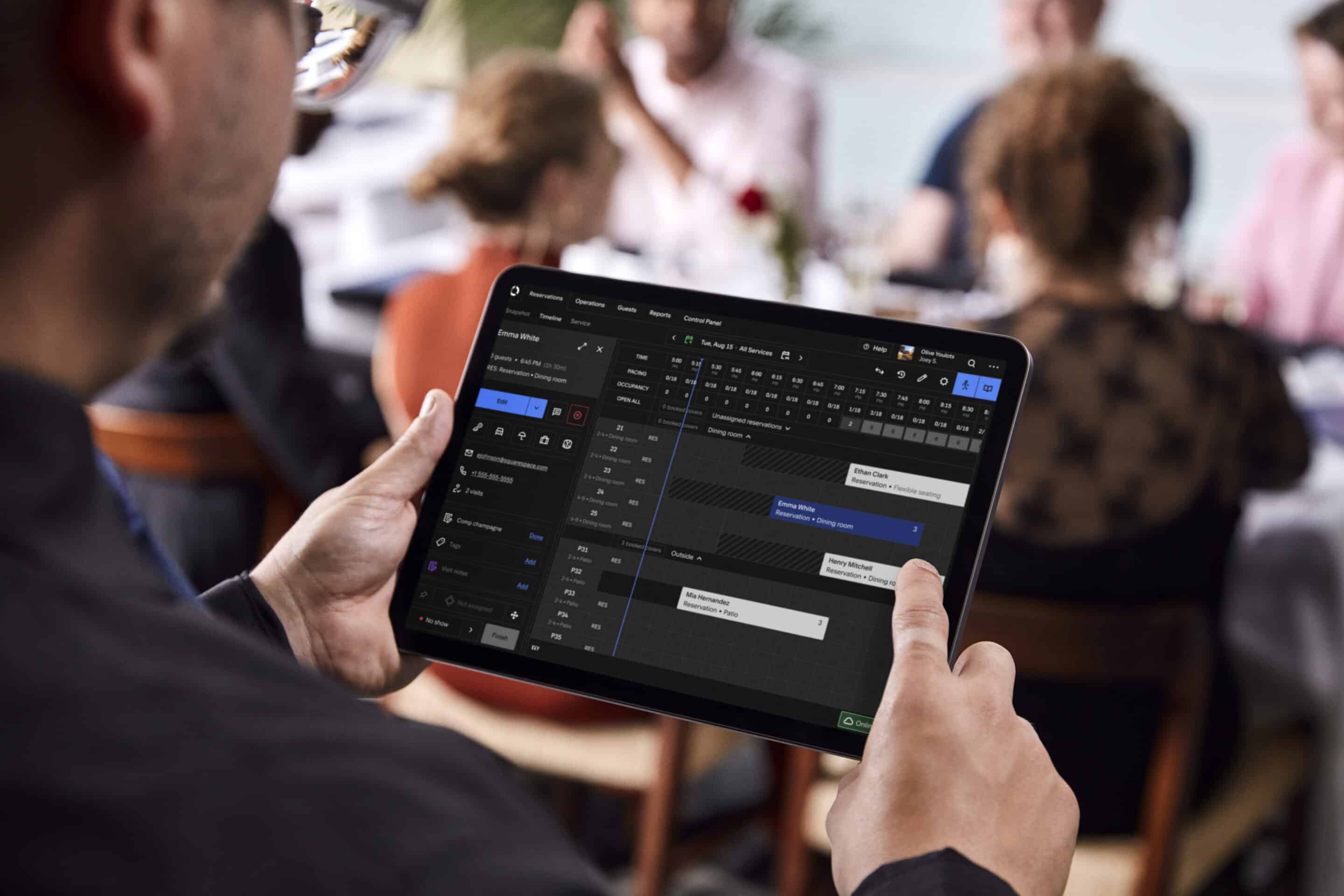
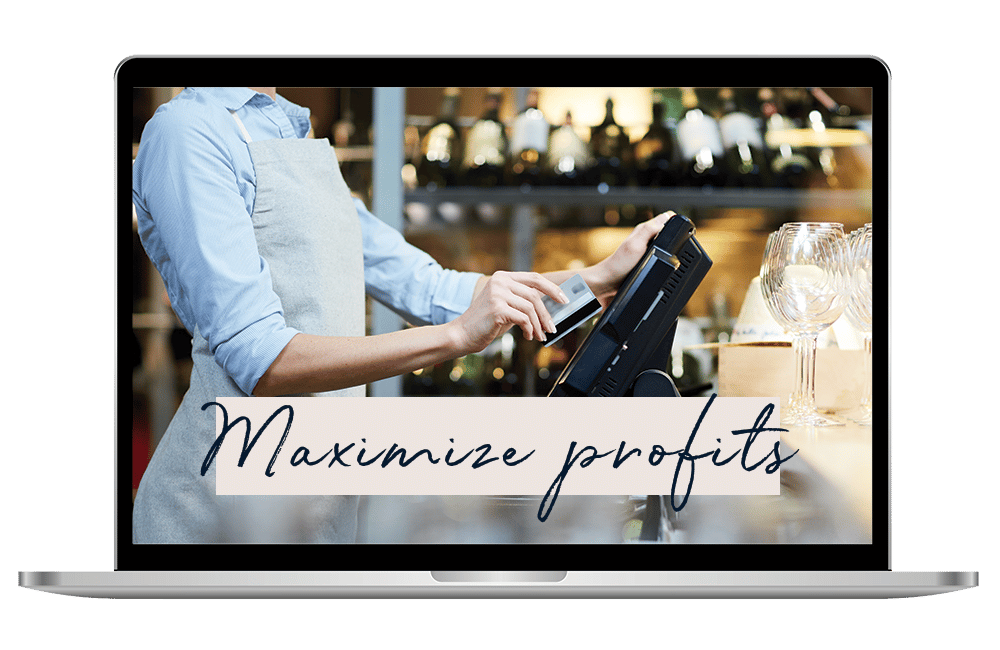
The three costly mistakes you could unknowingly be making?
Find out in this FREE guide and restaurant assessment specifically designed to reveal the unexpected hurdles standing between you and exponential business growth.
Thank You To Our Sponsors
For a limited time only, popmenu is offering our listeners $100 off your first month plus an unchanging lifetime rate.
Request a DEMO:
Increase restaurant sales, optimize guest throughput, and boost customer engagement all on one seamless platform.
Request a demo!
Want to become a podcast sponsor?
Please get in touch with Roger at roger@restaurantrockstars.com
